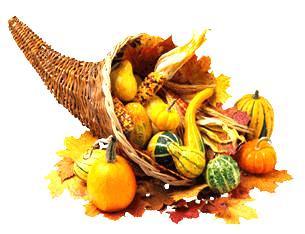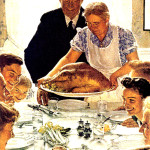Thanksgiving—or pre-Christmas, as it is known in marketing circles—is upon us, and between reading Truman Capote (“A Thanksgiving Visitor”) and Lydia Maria Child (“Thanksgiving Day”) and tossing around the football (but not to Tru or Mrs. Child, I hope), spare a kind thought for Sarah Josepha Hale. From the extinct American Enterprise:
Over the river and through the wood, to Grandfather’s house we go…Ah, Thanksgiving, our loveliest secular holiday.
George Washington issued the first National Thanksgiving Proclamation on November 26, 1789, but the early presidents, disproportionately Virginian and of a states’ rights disposition, regarded such proclamations as excessively Yankee and Federalist. Even John Quincy Adams, the ultimate codfish President, was reluctant to be seen as “introducing New England manners” by a public acknowledgement of Thanksgiving.
The antebellum New England novelist and editor Sarah Josepha Hale is to Thanksgiving what Stevie Wonder is to Martin Luther King Day. The indefatigable Hale propagandized ceaselessly for the glory of late November Thursdays, pumpkin pie, roasted turkey, “savory stuffing”—everything but the Detroit Lions. It took 35 years and a civil war, but Mrs. Hale’s efforts paid off when President Lincoln declared the last Thursday in November a national day of Thanksgiving and a legal holiday.
Andrew Johnson, ever the contrarian, designated his first Thanksgiving Day in December, but his successor, Ulysses Grant, began a 70-year practice of setting the date on the last Thursday in November. The states were free to go their own ways, and Southern governors often opted for idiosyncratic observances or none at all. As Thanksgiving historian Diana Karter Applebaum notes, Texas Governor Oran Milo Roberts refused to declare Thanksgiving in the Lone Star State, sneering, “It’s a damned Yankee institution anyway.” But the South, too, eventually succumbed to this succulent and sacred day.
Then along came Franklin D. Roosevelt.
It seems that in 1939 Thanksgiving was to fall on November 30th, a matter of consternation to the big merchants of the National Retail Dry Goods Association (NRDGA). The presidents of Gimbel Brothers, Lord & Taylor, and other unsentimental vendors petitioned President Roosevelt to move Thanksgiving to the previous Thursday, November 23, thus creating an additional week of Christmas shopping—and to the astonishment of those Americans without dollar signs in their eyes, the President did so. (Not all merchants favored the shift. One Kokomo shopkeeper hung a sign in his window reading, “Do your shopping now. Who knows, tomorrow may be Christmas.”)
Opinion polls revealed that more than 60 percent of Americans opposed the Rooseveltian ukase; dissent was especially vigorous in New England. The selectmen of Plymouth, Massachusetts informed the President, “It is a religious holiday and [you] have no right to change it for commercial reasons.” Thanksgiving is a day to give thanks to the Almighty, harrumphed Governor Leverett Saltonstall of Massachusetts, “and not for the inauguration of Christmas shopping.”
Although the states customarily followed the federal government’s lead on Thanksgiving, they retained the right to set their own date for the holiday, so 48 battles erupted. As usual, New Deal foes had all the wit, if not the votes. A New Hampshire senator urged the President to abolish winter; the Oregon attorney general versified:
Thirty days hath September,
April, June, and November;
All the rest have thirty-one.
Until we hear from Washington.
Twenty-three states celebrated Thanksgiving 1939 on November 23, and another 23 stood fast with November 30. Two states, Colorado and Texas, shrugged their shoulders and celebrated both days—Texas did so to avoid having to move the Texas-Texas A&M football game.
This New Deal experiment in Gimbelism lasted two more years, until finally the NRDGA admitted that there was little difference in retail sales figures between the states that celebrated Thanksgiving early and those that clung to the traditional date. Without fanfare, President Roosevelt returned Thanksgiving 1942 to the last Thursday in November. Mark Sullivan remarked that this was the only New Deal initiative FDR ever renounced.
Just as Roosevelt’s megalomaniacal refusal to observe the two-term tradition set by George Washington necessitated the 22nd Amendment, so did his flouting of Thanksgiving precedent require corrective legislation. In a compromise of sorts, FDR signed into law a bill fixing Thanksgiving as the fourth Thursday—not the last Thursday—in November. Never again would Thanksgiving fall on November 29th or 30th. The states followed suit, although Texas held out until 1956.
As we gather together this Thanksgiving, say a silent thanks for Sarah Josepha Hale. And save a drumstick for the resisters—then and now.







9 comments
Siarlys Jenkins
Christmas is an even more sordid tale.
New England had criminal penalties for celebrating Christmas — not because they were atheists, but because it was considered Popish idolatry. High church Anglicans further south attended Christmas mass — sometimes it was the only time of the year they went to church — but that was about all. It wasn’t until the 1840s that observance of Christmas became a common event. It was inspired, naturally, but a committee of New York businessmen, looking for a way to expand midwinter sales.
So, when you hear people talking about putting Christ back into Christmas, well, that’s because Christ was never really part of it to begin with.
E.A. Andonian
I feel much more informed about Thanksgiving’s history after having read this article, Uncle Bill. We will indeed toast Sarah Josepha Hale at our Thanksgiving dinner. Thanks.
Bill Kauffman
How to honor FDR, John? Hmmm…how about a morning reading (under slate gray November sky) of Robinson Jeffers’s The Double Axe (1948), a volume of anti-FDR, anti-empire poems? Bennett Cerf and Random House refused to publish ten of the poems, including one which had FDR meeting Woodrow Wilson in Hell.
But hey, it’s Thanksgiving, and I give thanks that Jeffers, whom Robert Hass called “an old-fashioned Jeffersonian republican…defender of the spartan and honest American commonweal against the thickening of empire,” is still read, while such FDR lickspittles as Archibald MacLeish (e.e. cummings called him “macarchibald maclapdog macleish”) molder unread.
So let’s instead raise a glass of pre-turkey beer to the only good Roosevelt—Teddy’s irrepressible daughter Alice, who called her cousin “Feather Duster Roosevelt” and who once sighed, “When I think of Franklin and Eleanor in the White House, I could grind my teeth to powder and blow them out my nose.”
D.W. Sabin
“Its a damned Yankee Institution”…..so it seems, is Winning the World Series.
Despite brushing up hard against the wretchedness of so called “Black Friday”…it is likely one of the best, if not the best holiday of the year…for its simplicity….cooking a turkey, trading lies and family stories…often one in the same, and deciding who will be the collective object of ridicule this year. All culminating in falling to sleep to football.
Happy Thanksgiving to all….and a moment of Thanks for the ever-reliable humorous strolls of Kauffman.
Best Wishes to even Lundy.
John Willson
My old friend and Confederate, Clyde Wilson, admires the Thanksgiving feast because the first one was held, of course, in Virginia on December 4, 1619. Many of our southron friends regard claims of “New England manners” as just another Yankee imperialism. Alas, for them and the rest of us, it has become Thanksgiving, the day before Black Friday, the true beginning of “The Holidays.” Bill, we will make a toast at our extended Family table to Sarah Josepha Hale. What should we do for FDR?
Bob Cheeks
Oh Lord, Thanksgiving Day, the product of consolidators! Never-the-less anti-federalist that I am, I shall continue the tradition of overeating…for peace, family, and God! Thanks Bill.
Comments are closed.